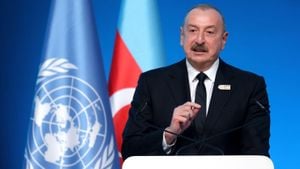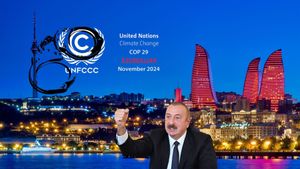The Israeli political scene has been stirred once again, this time by Bezalel Smotrich, the nation’s Finance Minister, known for his far-right views. Recently, he expressed strong support for the annexation of the West Bank, indicating hopes for Israeli sovereignty over the area by the year 2025. This announcement raises significant concerns not only for Palestinian rights but also for the broader regional stability and international relations.
Smotrich's remarks came during a speech where he proclaimed, "2025 will be the year ... of sovereignty in Judea and Samaria," using the biblical names for the territory. For him, the elections of allies, such as Donald Trump, could provide the necessary political backing to realize this aspiration.
This rhetoric did not go unnoticed, especially by international leaders. Hamish Falconer, the UK’s Middle East Minister, condemned Smotrich's statements as not only illegal but also detrimental to peace efforts. He passionately asserted, “Annexation only undermines the prospects for peace.” According to Falconer, such actions would lead to greater instability within the region.
Falconer's condemnation reflects the gravity of the situation. The territory Occupied by Israel since the Six-Day War of 1967 is pivotal to the long-sought two-state solution, which envisions independent states for both Israelis and Palestinians. His call for Prime Minister Benjamin Netanyahu to reject Smotrich’s overtures emphasizes the UK government's commitment to resolving the Israeli-Palestinian conflict through dialogue and stability.
The outcry against Smotrich's statements isn't limited to the UK. Jordanian officials, along with various international advocacy groups, have also voiced heavy criticism. They argue the proposed annexation deals another blow to the already fragile peace process and exacerbates the humanitarian situation for Palestinians living under occupation. Following this backlash, neighborhood relations and alliances could see considerable strain.
Smotrich’s comments seem increasingly out of touch with the global narrative surrounding the conflict. Many human rights organizations point out the dire humanitarian situation facing Palestinians. With soaring tensions following recent escalations of conflict, calls for peace dialogues have grown louder.
After his controversial speech, activists and citizens initiated protests both within Israel and internationally. They rallied against the potential annexation and urged leaders to prioritize peace rather than territorial ambition. Some protestors took to social media, utilizing hashtags to gain global attention and support, underlining their desire for equality and justice for Palestinians.
Netanyahu's government, facing pressure from right-wing coalitions, must navigate between satisfying these hardliners and adhering to international law, which firmly declares annexation as illegal. Such balancing acts rarely bear good fruit.
The rising tensions also prompt worries over the international community's potential responses to such unilateral moves. The European Union, for example, has historically been opposed to any changes to the status quo without direct negotiations between the two parties. Allegations of annexation could prompt severe diplomatic repercussions, possibly including sanctions against Israeli officials.
Notably, Palestinian officials have rejected the notion of annexation outright, emphasizing their rights to statehood and sovereignty over the territories. They liken Smotrich’s declarations to historical injustices faced by their people. The Palestinian Authority has reiterated their commitment to statehood and the rights defined by numerous UN resolutions.
While this is evident locally, the broader geopolitical fabric plays its role too. The Israel-Palestine conflict becomes increasingly intertwined with global affairs, particularly with how nations perceive alliances and discontent. Recent events indicate changing dynamics, wherein traditional powers either entrench themselves for negotiations or withdraw from progressive dialogue altogether.
Beyond regional impacts, the casual observer can see the ramifications homing in across the globe. Protests around world capitals highlight the pervasive influence of social media as platforms for political awareness and activism. Supporters for Palestinian rights, often comprising young, digitally-savvy activists, find their voices amplified through online media.
Analysts speculate on the motivations behind Smotrich’s aggressive stance, considering internal political pressure combined with historical grievances within his party. Some, attempting to decode his approach, argue it stems from underlying fears of democratic shifts encouraging more moderate policies within Israeli leadership.
Nonetheless, the rumbles of discontent are palpable among the Israeli populace as well. Citizens on both sides increasingly question their governments' handling of the conflict, the prospect of peace, and what future relationships between their peoples will look like post-annexation talk.
Meanwhile, international civil society organizations are mobilizing to counter the rhetoric, focusing on grassroots movements promoting peaceful coexistence regardless of governmental actions. These organizations aim to remind both parties of their stake and interests tied by numerous years of shared history, culture, and territory.
Falconer also noted the UK’s commitment to securing the release of hostages held by Hamas, including British national Emily Damari. He made this statement amid rising tensions and reported ceasefire violations. Urging the necessity of civilian protection and humanitarian aid delivery remains among the government’s key objectives concerning Gaza.
Despite significant challenges, there is still hope for avenues toward dialogue. Various reports on negotiation avenues suggest lesser-known channels might provide fresh perspectives toward conflict resolution. Ground-level activists assert the importance of engaging local leaders and communities who possess comprehensive understandings of their socio-political landscapes.
Should annexation proceed as planned, expect ripples not just within West Bank locales but throughout geopolitical alliances. The tensions surrounding this dialogue will remain contentious and notable—shaping the regional, and possibly global, response.
Overall, Smotrich's comments reflect deep-seated societal divisions within Israel and resonate loudly with the historical grievances experienced by Palestinians. While ambitions for territorial claims swell, the call for peace and justice, echoing through social media and street protests, signals the backdrop of global concern as humanity faces yet another moment where principles clash with ambition. The aftermath—and how it might evolve—will be dictated by those committed to coexistence rather than division.



